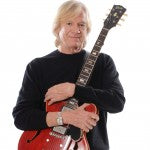
Justin Hayward: Still giving the people what they want
When Justin Hayward heads into New York City for his Saturday night gig at The Concert Hall, it’s not just another show. No show in the Big Apple ever is.
“I have to admit that it is equal to a London date, I suppose,” he said. “It’s every musician’s dream and ambition to play a nice venue in New York, and I’ve played my share.”
Some he’s even played twice – in one day – like he did when he and his Moody Blues band mates played two sold out shows in Madison Square Garden back in 1972. Yes, two sold out Garden shows in one day.
“I remember that day that Ray (Thomas) and I went outside between shows and we had some tickets for the second show and we just gave them away to people,” he recalls. “People didn’t know who we were. Back then, the music was the celebrity, not anybody in the band, but people were very grateful.”
The ticket scalpers not so much, because the Moody Blues in NYC was always a big deal, a reality borne out by the band eventually receiving the Garden’s Golden Ticket award in 1981 for selling 100,000 tickets in the venue. That will make you remember a city, and decades later, Hayward is looking forward to his return this weekend.
“The Concert Hall is just such a lovely place to play and perfect for the kind of woody, acoustic show that I’m coming there with,” he said. “I did it last year as well and I absolutely loved it. I’m not sure with all those wooden seats it’s all that comfortable for everybody (Laughs), but it certainly is for the band to play. It’s a lovely sound and it’s very enjoyable, but I think every New York performance sticks in my mind.”
Not just for him, but for the fans as well, a diehard group that not only supports Hayward’s work with the Moodys, but his solo efforts as well, with the latest, 2013’s Spirits of the Western Sky, achieving critical and popular acclaim. That’s great in terms of keeping the 68-year-old on the road and in listeners’ ears, but more importantly for him, a solo career is an essential part of him keeping his creative sanity intact in between Moodys assignments.
“For me, it’s been vital,” Hayward said. “Through Eagle Rock, who have been very gracious and very kind, kind of like Decca, in so much that they said ‘listen, whatever you want to do, we’re fine with it; just do what you want to do.’ They put great trust and faith in me. But I definitely needed a balance from the Moody Blues, and one thing benefits the other. Of course, the days of big advances for records and tours are gone, so the Moody Blues make it possible for me to invest and then wait for it to come in afterwards with my own solo thing. Also, I have the pleasure with the Moodys of being part of a big production, but that’s only satisfying if I can do the other thing as well. If I can do something quiet where I can hear every nuance of the sound, where I can bring my home acoustic guitars and go back to being an acoustic guitar player / singer-songwriter and give it that balance, then I come back to the Moodys refreshed and having learned a lot of things and having had a lot of fun. So one is a great compliment to the other and it’s a great balance, so I needed to have that.”
As for those fans that follow him around the world, he is appreciative for their support, while also knowing that in turn, when the lights go down, he will give them what they want, and that may be the secret of his longevity right there.
“I’d be disappointed if I went to see somebody and they didn’t play their stuff,” Hayward said. “I went to see Steely Dan near where I live last year and they played half a dozen of the classics and that made the whole evening for me, it really did. And there are four or five things that I couldn’t get off stage without playing. People would be really disappointed. And those are the obvious things like Tuesday and Nights and Question and Forever Autumn, which I never get to do anyway. But the rest, I decided to really look at parts of the Moodys catalog where I had written things when I was in some kind of emotional turmoil, and I needed to cathartically get back into them to see what the hell was going on. There were times through the Moodys’ career when things were quite difficult within the band, and some of the songs that came out then were never hits, but they were very emotionally entwined in my life. So I decided to choose quite a few of those in amongst the lighter stuff that everybody knows, and it’s been cathartic for me, and I think the Moodys fans have liked it, as well as the solo stuff.”
For an artist who has written timeless tunes like “Nights in White Satin,” “Tuesday Afternoon,” and “Your Wildest Dreams,” Hayward is remarkably grounded. When you ask him how he keeps his ego in check knowing that he’s the creator of songs that people will be listening to a hundred years from now, he laughs.
“That’s a very simple one to answer,” he said. “Nights is a strange example of a hit record because when we recorded it, so many people were saying ‘don’t put that out, it’s gonna fail.’ (Laughs) And the record company in America said that. Four and a half minutes long, what the hell? They put “Tuesday Afternoon” out and thankfully they did because it gave us our first real hit with our own material. But I was just between 19 and 20 years old when I wrote “Nights in White Satin” and so for the last 50 years people have been saying to me ‘can’t you just write another one?’ (Laughs) So it’s always balanced by that, and your ego doesn’t get a chance to run away with you.”
Justin Hayward plays The Concert Hall in NYC on Saturday, November 1. For tickets, click here
